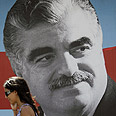
Tribunal publishes indictment in Hariri murder
International tribunal, accused by Hezbollah of being an Israeli plot against Lebanon, finds no smoking gun in phone records connecting four members of terror organization to former Lebanese PM's murder
The special court investigating the assassination of former Lebanese Prime Minister Rafik Hariri has published a 47-page indictment against four members of the Iranian-backed Hezbollah for alleged involvement in the deadly truck bombing.
Prosecutors analyzed a vast network of telephone records that link four Hezbollah members to the 2005 assassination, but there is no clear smoking gun in the case, according to an indictment unsealed Wednesday.
- Receive Ynetnews updates directly to your desktop
The publication comes after the Special Tribunal for Lebanon said last week that Lebanese authorities had been unable to arrest the four suspects or serve them with their indictments.
The suspects include Mustafa Badreddine, a Hezbollah commander and the suspected bomb maker who blew up the US Marine barracks in Beirut in 1983, killing 241 Americans.
The other suspects are: Salim Ayyash, also known as Abu Salim; Assad Sabra and Hassan Anise, who changed his name to Hassan Issa.
They are accused of involvement in the February 14, 2005, truck bombing that killed Hariri and 22 others – a number that includes a suicide bomber.
Hezbollah has denied involvement and said it will never turn over the suspects.

The four suspects (Photo: AFP)
Prosecutors acknowledge in the indictment's preamble that they have no smoking gun linking the suspects to the attack despite years of painstaking investigations. The file relies to a large extent on circumstantial evidence "which works logically by inference and deduction," the indictment said.
Tribunal prosecutor Daniel Bellemare welcomed the unsealing of the indictment, saying it "answers many questions" about the attack.
"The full story will however only unfold in the courtroom, where an open, public, fair and transparent trial will render a final verdict," he added.
Phones shut off minutes before explosion
With Lebanon apparently unable to arrest the suspects, the court – unusually for an international tribunal – could try the suspects in their absence.
The indictment that was released, which has many words and numbers blotted out in black ink, relies substantially on telephone records linking the suspects to the crime. It alleges that a "red network" of cell phones was used by members of the assassination team.
The phone records showed a flurry of calls shortly before Hariri's assassination. The cell phones stopped being used two minutes before the explosion and were never used again. The indictment said the records showed "a coordinated use of these phones to carry out the assassination."
Hezbollah leader Sheik Hassan Nasrallah has long sought to cast doubt on the security of the Lebanon's telephone network, however, and he will likely use the tribunal's evidence to further cast doubt on the court's claims. Nasrallah has called the tribunal an Israeli plot against Lebanon.
Lebanese officials have confirmed that Israel has penetrated and has great control over Lebanon's telecommunications networks. In 2010, authorities detained two senior employees of one of the country's two cellular telecommunication companies on suspicion that they were spying for Israel. They remain in detention several months after their arrest.
Then telecommunications minister Charbel Nahhas confirmed at a press conference held with experts in the field in November that Israel was able to infiltrate Lebanon's mobile telecommunications network and could manipulate phone calls and short messages.
Nasrallah has repeated those claims and said Israel bugged the mobile phones of Hezbollah members, allowing it to make false phone calls and send false text messages and track the users' movements.
- Follow Ynetnews on Facebook










